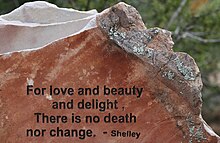Talk:Percy Bysshe Shelley
Add topicAppearance
Latest comment: 9 months ago by Arlo Barnes in topic image to verify
I was always under the impression that it was just called "Ozymandias," not "Ozymandias of Egypt." No?
Why exactly are the quotes by Salt featured? His wishful thinking that Shelley was somehow rediscovering god are disproved within the very poems he cites as evidence (e.g. Hellas, which Holmes recognised as "one of the most sophisticated and historically mature statements of Shelley's atheism"). If we feature Salt we may as well quote all the 19th and 20th century reactionaries who disguised their distaste for his politics as literary criticisms. 82.69.106.43 21:23, 13 September 2008 (UTC)
- The second quote by Salt concludes with "There is no warrant whatever in his writings for the strange pretension that, had he lived longer, his objections to Christianity might in some way have been overcome." This sounds opposite to his allegedly believing in "wishful thinking that Shelley was somehow rediscovering god." - InvisibleSun 22:02, 13 September 2008 (UTC)
Unsourced
[edit]- Nothing wilts faster than laurels that have been rested upon.
- When my cats aren't happy, I'm not happy. Not because I care about their mood but because I know they're just sitting there thinking up ways to get even.
- Also, and more plausibly, attributed to Penny Ward Moser
- The real difference between Byron and Shelley is this: those who understand and love them rejoice that Byron died at thirty-six, because if he had lived he would have become a reactionary bourgeois; they grieve that Shelley died at twenty-nine, because he was essentially a revolutionist and he would always have been one of the advanced guard of socialism.
- The more I see the more I doubt whether people ever really make aesthetic judgements at all. Everything is judged on political grounds which are then given an aesthetic disguise. When, for instance, Eliot can't see anything good in Shelley or anything bad in Kipling, the real underlying reason must be that one is a radical and the other a conservative, of sorts.
image to verify
[edit]
and delight,
There is no death
nor change. — Shelley
From wikisource:en:page:Prometheus Unbound - Shelley.djvu/177, it seems. Arlo Barnes (talk) 19:11, 28 February 2024 (UTC)
